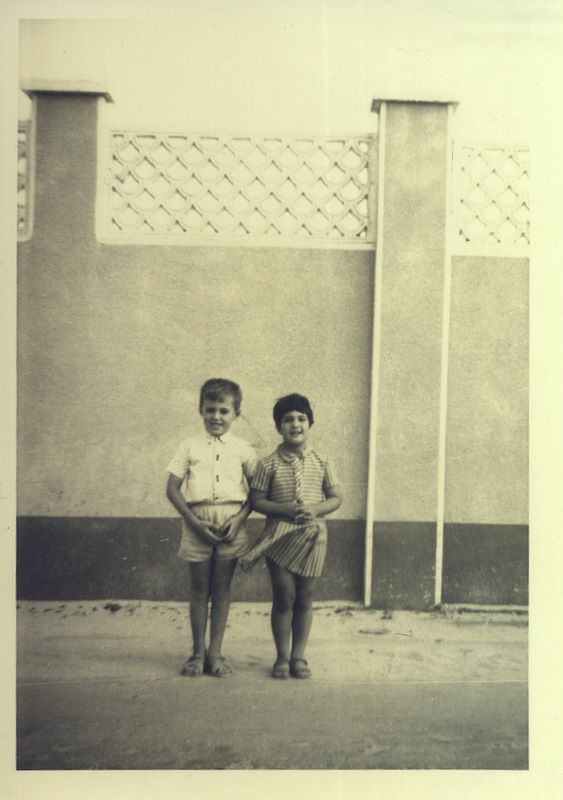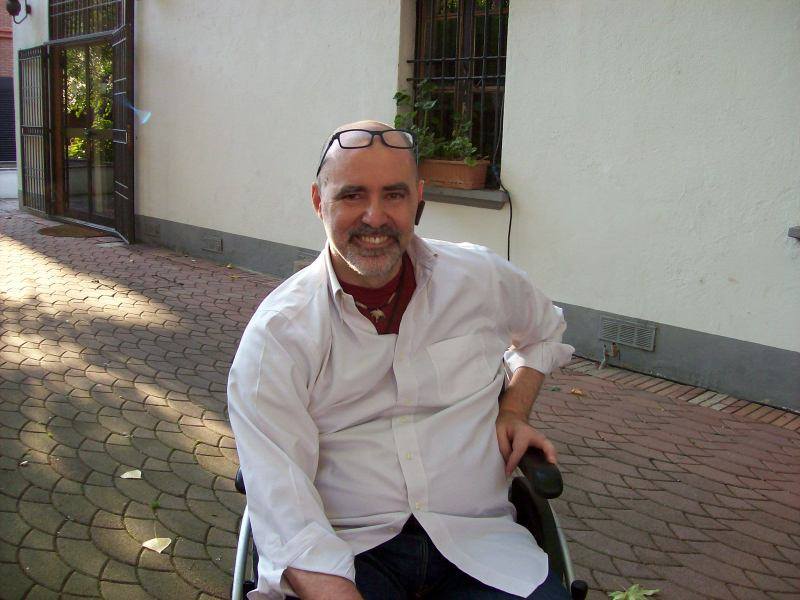Really Lucky! Posted by Serena on May 5, 2017 in Uncategorized
Today I want to tell you about a book that is very special to me. It’s called Tutte Le Fortune – Badavo Ai Badanti (Really Lucky – I Took Care Of the Carers), an autobiography written by my childhood friend Riccardo Taverna.

Riccardo, better known as Ricky, was my neighbour in Benghazi and my best friend at nursery school. His mum Tina used to drive us to school in her famous Cinquecento! (La Mia Cinquecento). So I was overjoyed when we got back in touch again recently having not heard from each other for nearly forty years. It was also with great sadness, however, that I discovered that he is afflicted by a neurological degenerative disease called CIDP (Chronic Inflammatory Demyelinating Polyneuropathy).
It’s Ricky’s fight against his illness that is the main theme of his autobiography Tutte Le Fortune.
When Ricky realised that something was wrong with him, he was just 23 years old. Ricky started noticing that his right hand would loose its grip, and he would drop things without even being aware. It took quite a while to diagnose his illness as it’s relatively rare, but once he knew what the problem was he felt more positive, as could now prepare himself to fight it.
In his youth Ricky used to love sport, especially Judo, in fact he managed to win a bronze medal in the Italian National Judo Championship. He approached the fight against his illness in the same way as he did a Judo match: whenever he found himself down on the mat he’d pick himself up and find another way to attack his adversary. Ricky has no fear of new, experimental therapy, even when the doctors have explained that chances of survival are very low. This was the case when he decide to undergo a spinal cord transplant.
Apart from the more traditional medical treatment which was attempted on him, the book also describes the rather less scientific approach taken by Ricky’s desperate parents, such as the visit to the famous exorcist Monsignor Milingo, or a consultation with a cartomante (fortune teller).
As if developing Chronic Inflammatory Demyelinating Polyneuropathy wasn’t enough, Ricky also correctly self-diagnosed himself as suffering from Parkinson’s disease, and then, the ‘cherry on the cake’, he suffered a heart attack!
An integral part of the narrative is Ricky’s desperate search for un badante (a carer) who would help him to carry on with his daily life. This turned out to be far more complicated than expected, in fact he worked his way through 49 carers, of all nationalities and backgrounds, before finding the right one.
Some of the more memorable ones are: a limping Russian ex-bodyguard, who would scan the rooftops for snipers before letting Ricky out of the car; a Fillippino with a bad case of butter fingers who explained away all his little accidents and Riccardo’s illness as the work of the devil, adorning the whole apartment with figurines of the Madonna.
And then, finally, he found Stepan (Ukrainian), who after an uncertain, perhaps overenthusiastic start, turned out to be the perfect carer.
When we met up in Verona last month during a reunion of old friends from Benghazi (Una Visita A Verona), Ricky asked me which was my favourite part of the book, a difficult question! I settled on one particular tale about the first and, luckily, last time his mother went to see him doing Judo: as Ricky gripped his opponent tightly, he heard his mum’s worried voice: “Riccardo, mi raccomando, non fargli male!” (“Riccardo, please, don’t hurt him!”). Ricky smiled, and then asked me which part of the book I thought was the most popular amongst his readers.
Of course, the sex story! When Ricky was first diagnosed with CIDP in his early twenties, the family doctor asked his mother Tina to find out how Ricky’s sex life was. Tina eventually managed to breach the topic with Ricky’s girlfriend, Diane, and after an embarrassing conversation she finished by saying: “Ecco, Diane, non farlo stancare“ (“Okay Diane, don’t tire him out”).
Ricky’s mum thought that her mission was accomplished and the subject, thank goodness, closed. However Diane immediately sought to reassure her: “Non si preoccupi, signora, se si stanca vado sopra io” (“Don’t you worry, signora, if he gets tired I’ll climb on top”), leaving poor Tina with her mouth agape!
Last, but in no way least, there’s Nelly, Ricky’s wonderful wife and life companion, or as Ricky describes her: “Il mio punto di riferimento e inesauribile fonte d’ispirazione” (My point of reference and inexhaustible font of inspiration). Ricky met Nelly at a friends’ dinner party shortly after his spinal chord transplant. At that time Ricky was able to walk more or less independently, but he knew he was by no means cured. When he realised that Nelly was the one for him, he asked her to come and visit the doctor with him to make sure that she completely understood the severity of his illness, and its implications for a potential wife. When Ricky asked her if she truly realised how bad the future could be she simply replied: “Ho capito. Se e quando succederanno, li affronteremo” (“I understand. When and if it happen, we’ll face it”).
Riccardo and Nelly got married on his birthday, a date deliberately chosen by Ricky to make sure that he’d never forget their wedding anniversary!
N.B. Tutte Le Fortune, published only in Italian by PIEMME, is also available as an ebook.
You can find Riccardo’s blog here: https://badavoaibadanti.org/

Build vocabulary, practice pronunciation, and more with Transparent Language Online. Available anytime, anywhere, on any device.






Comments:
Alexandra:
Thank you for sharing this wonderful post about your old and dear friend! I really enjoy and appreciate your posts.
Just a couple of notes…the word badante…was new to me and the translation you provide “carer” is not a word I know in American English. After looking it up, a better translation for me is “caretaker”.
Also, the English caption under that sweet childhood photo of you and Ricky should read: Ricky and me as opposed to Ricky and myself. If you take away the “Ricky and” part, the “me” stands alone correctly…”myself” does not.
Serena:
@Alexandra Grazie Alexandra per il commento e per i suggerimenti. A presto
Geoff:
@Alexandra Ciao Alexandra, British English is my mother tongue, and when I edit our blogs that’s the standard that I follow.
Hence I always translate badante as carer.
Caretaker’ is problematic because in British English a caretaker is what would be called a janitor in American, as in ‘the school caretaker’, the person who is responsible for the cleaning and maintenance of the school.
Another translation that may be more appropriate is ‘caregiver’.
Hence Ricky’s book’s secondary title ‘Badavo ai Badanti’ is perhaps best translated in British English as ‘I Took Care Of The Carers’, and in American English ‘I Took Care Of The Caregivers’.
However, the important thing to know is that the verb badare means ‘to take care’.
A presto, Geoff 🙂
Cecilia:
Ché bella storia, Serena! Thanx for sharing
jaclyn:
Just beautiful. Thank you for this.
Elizabeth H:
Hi Geoff and Serena: Your blogs are wonderful, they are all filed and indexed on my computer. Ages ago you did a blog on volere, dovere and potere. Is there any chance of some help with potere? I tried to translate to Italian: I could not do this. Google gave non ho potuto. I was going to use non potrei fare. I’m a bit confused.
Serena:
@Elizabeth H Salve Elizabeth!
Unfortunately ‘could’ is used with two different meanings in English, so it depends on the context. Does “I could not do this” mean “I wasn’t able to do this” (= non ho potuto fare ciò), or “I would not be able to do this” (non potrei fare ciò)? You need to be clear about its meaning.
Saluti da Serena